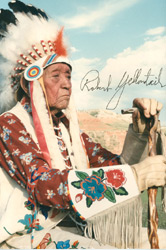Robert Yellowtail
1880 - 1988
Updated: September 2, 2020

Born in Lodge Grass, Montana in 1889, Robert Yellowtail was a leader of the Crow Nation. Yellowtail was the first Indian to hold the post of Agency Superintendent. Described as a "20th Century Warrior”, Yellowtail had a reputation as a champion for all Indians, because in 1910, Montana Senator Thomas Walsh introduced a bill in Congress to open up the Crow Indian Reservation to white homesteaders. That began a personal 7-year span of attacks on Crow lands.
Chief Plenty Coups, the last of the traditional Crow chiefs, determined to fight Walsh’s efforts, knew he needed educated young men with knowledge of the law to help. He called upon Robert Yellowtail to return home from the University of Chicago and assist in the fight. Young Yellowtail, under the leadership of Plenty Coups, was exceptional. In April 1917, after recurring efforts, the Crow won the fight as Yellowtail’s reputation as a champion for all Indians soared!
2 years later he returned to Washington D.C. as the Crow delegation leader to assist in the writing of the Crow Allotment Act. This piece of legislation would preserve what had been hard won, ensuring that Crow lands could never again be taken without tribal consent After the Congressional bill passed, Robert Yellowtail remained an activist and a strong advocate for preserving the Crow lands and obtaining human rights for all Indians, including citizenship and the right to maintain their culture and autonomy.
In the 1930s, with the election of Franklin Roosevelt and the beginning of The New Deal, the Crow people had high expectations. Yellowtail caught the President’s attention and the new director of the Indian Office, John Collier. In 1934, “Robbie” as he was affectionately called, was appointed by the US government and unanimously elected by his tribe to be the first Indian in history to hold the post of Agency Superintendent.
According to writer Constance J. Poten, ‘he seized the opportunity to return culture, pride and a land-based economy to his people. Yellowtail got white ranchers on the reservation to return 40,000 acres to the tribe and then stocked the land with buffalo from Yellowstone National Park. Using federal funds, he brought in herds of horses and cattle from…Canada, and he built the first Crow hospital.'
A champion of higher learning, Yellowtail once stated "the Congress of the United States should make it possible for all Indians to obtain an education…Education opens the doors of opportunities so that Indians could become lawyers, doctors and take an active part in business life..."
He held the position of Superintendent of The Crow Reservation for 11 years, resigning in 1945 to start another battle, one that split the tribe and made him enemies amongst his own people. This was the fight to stop the taking of land by the US Government and the damming of the sacred Bighorn River. Against the wishes of the tribe, the government continued to push the issue and Yellowtail conceded that it was time to negotiate. His fifty million dollar proposal was rejected by Eisenhower’s administration. A campaign of bribery turned many of the Crow against Yellowtail. In the end, the building of the dam won out at a great loss to the Crow people for a mere five million dollars. To make matters worse, contrary to his protests, the government named the structure for Yellowtail. Yellowtail went on to more achievements, not only as chairman of the Crow Tribal Council, but in other efforts, including the issue of the underselling of Crow coal. Yellowtail’s knowledge of the law saved the day! In January 1988, the Supreme Court ruled in favor of the Crow. In a contract with the State of Montana and the Westmoreland Coal Company, an initial thirty million dollars, plus annual payments of four million dollars, was promised.
Robert Summers Yellowtail, a patriarch of the Crow Indian Tribe, died Saturday, June 20, 1988 at his home. He was 98 years old. Mr. Yellowtail studied law and planned to become a lawyer but instead became involved in tribal affairs and politics. The University of Montana, School of Law eventually awarded him an honorary degree. He served several times as tribal chairman, and the Bureau of Indian Affairs appointed him superintendent of his reservation, the first Indian named to the post, which he held for 11 years.
Information found at:
The New York Times
Wikipedia!
Updated: September 2, 2020



